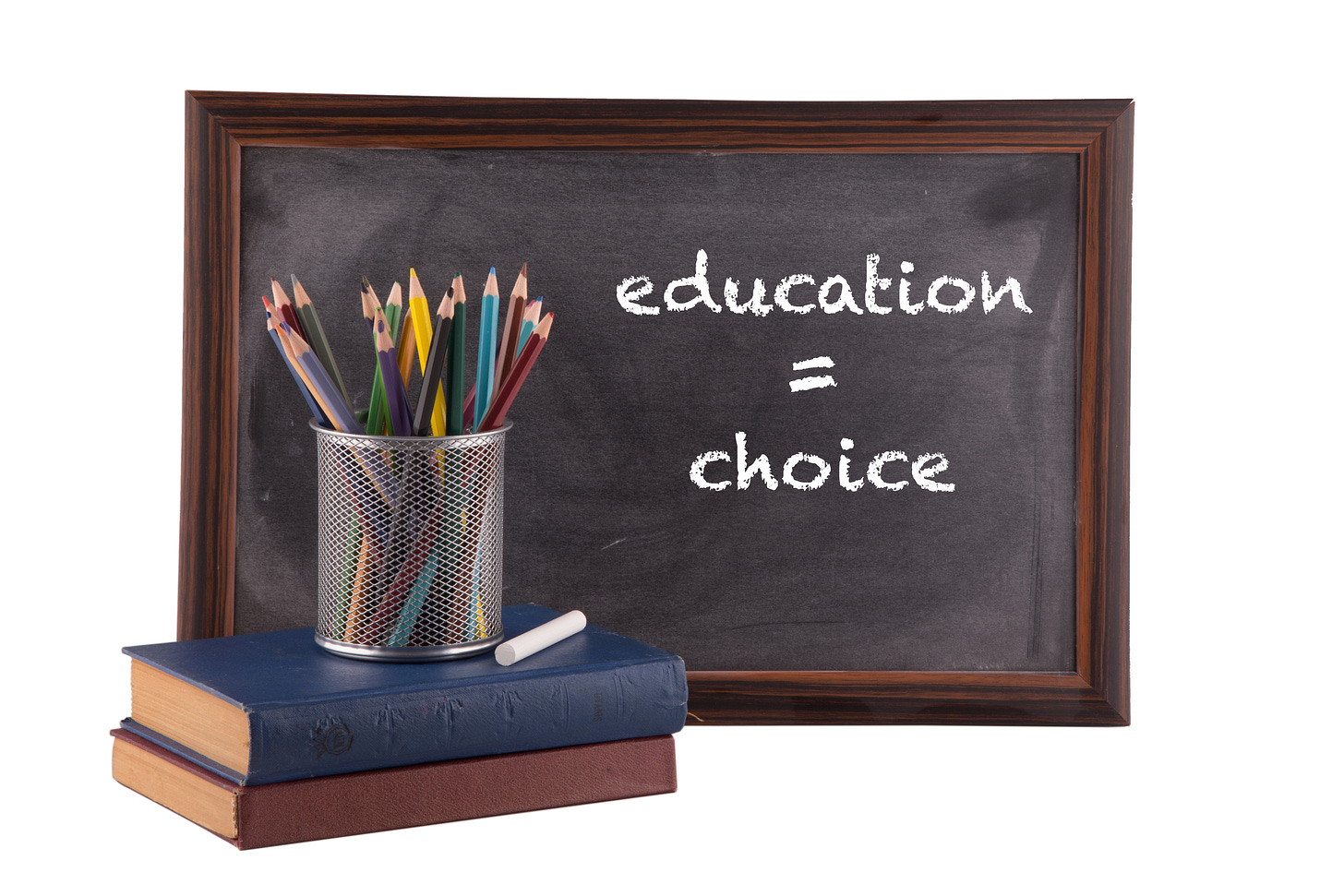E-Pluribus | June 30, 2021
Bans are bad but so is fear mongering, how school choice would impact the CRT debate, and fake news is easy - real knowledge is harder to come by.
A round up of the latest and best writing and musings on the rise of illiberalism in the public discourse:
Jesse Singal: Republican Bills Attempting To Ban Critical Race Theory Are Bad, But So Is Media Fearmongering About Them
Now the backlash to the backlash is getting some backlash according to Jesse Singal, so he engages in some enthusiastic bothsidesing in his latest post. While Republican legislatures have overreached in their attempts to fight (or appear to be fighting) CRT, Singal posits that the media is responding in kind by characterizing some proposed legislation as far more dangerous than they actually are. The bottom line is an erosion of trust on all sides.
Sometimes people ask me to compare the media and misinformation situations on the left and right. I usually say something like “I think the right has a more well-developed, pernicious ecosystem when it comes to misleading and hyperpartisan fare, but I worry that ‘my’ side is catching up.”
Enter the present, exceptionally exhausting debate over state-level Republican attempts to ban critical race theory in public-education settings (sometimes higher education, sometimes K-12, depending on the bill in question). This controversy is a mix of genuinely worrisome laws that have been passed or considered by Republican legislatures, laws that don’t actually seem to do much if you read them closely, and endless, endless grandstanding and distortion from just about everyone involved. (Yes, I am bothsidesing.)
[…]Overall, as Sachs suggests, it seems that many of the conservatives supposedly outraged by CRT, a specific legal tradition (albeit one with some fuzzy borders and ideas) that isn’t really taught in the K-12 settings they are now focusing on, seem to actually be mad about diversity trainings that are only tangentially connected to CRT, as evidenced by them leveling claims about curricula which “make white kids feel bad for being white,” and language to that effect. That’s a fair critique of some low-quality, low-evidence contemporary diversity trainings, but not really of CRT itself, unless you squint and cherry-pick a bit (Sachs, who is a good-faith writer and thinker, does note some examples of this sort of thing finding its way into public-school classrooms, and rightly says opponents of the laws should speak out against these instances).
But many liberals, for their parts, are misrepresenting the nature of CRT, claiming that its raison d'être is the mere honest discussion about America’s racist past and present, the true legacy of slavery, and so on. This is a bit misleading, given first that none of these discussions require a CRT gloss or framework, and second that CRT’s chief evangelists themselves straightforwardly describe their bundle of ideas as radical. “Unlike traditional civil rights discourse,” notes the introduction to the third edition of Critical Race Theory: An Introduction, CRT “questions the very foundations of the liberal order, including equality theory, legal reasoning, Enlightenment rationalism, and neutral principles of constitutional law.” So there are certainly some genuinely radical elements there, as well as, it should be said, some stuff that seems surprisingly obvious (more on that in an upcoming post in which I’m going to review that book).
[…]
I don’t necessarily blame the average person who doesn’t know what a climate survey is for reacting this way. I can understand how reading that text — or bits selectively snipped by mainstream outlets — could lead to this conclusion. I do blame these outlets for engaging in such breathless, fear-mongering coverage. Why not consult a privacy or First Amendment expert on the likelihood of this scenario coming to pass? Do these journalists really think a state government has such power?
When I say I’m worried that left-of-center media is heading down a similar path as right-wing media, this is what I’m talking about. Had sober, careful reporting taken place here rather than outrage-oriented clickbait, this storyline would have taken hold only in the most hyperpartisan, non-credible outlets. Instead, some mainstream ones helped to circulate it. That’s really bad!
Read it all here.
J.D. Tuccille: The Critical Race Theory Debate Wouldn't Matter if We Had More School Choice
It seems unlikely that school choice is going to take off any time soon given the entrenched opposition it faces, but J.D. Tuccille notes at Reason that if parents had more freedom to decide where their children would attend school, there would be less rancor about curriculum, including what the impact of Critical Race Theory is in the typical classroom. The market would rule.
In response, some states are banning the teaching of CRT—an approach that threatens to turn advocates of the ideology into free speech martyrs fighting the entrenched establishment. Trinity College's Isaac Kamola argues that many Americans oppose the ideology "because academic, journalistic and movement efforts to critically interrogate the lasting impact of slavery and American racism fundamentally challenge the free market fundamentalist ideology." That's a wildly tendentious claim, but ideological bans lend it a gloss of credibility.
[…]
That said, families that choose how their children learn—my own included—rather than defaulting to government-run institutions don't have to lose anything because we have largely escaped these battles. By homeschooling, or micro-schooling, or picking private or charter schools, we can avoid curricula permeated with ideas we find toxic and select those that present ideas of which we approve or, even better from my perspective, that encourage open debate among opposing perspectives.
[…]
Parents that reject liberalism and support CRT also have alternatives to battling over the content of schoolroom lessons. They can introduce their tykes to Ibram X. Kendi's Antiracist Baby Picture Book, marinate their kids in CRT-infused homeschooling, or send them to one of many private schools that offer willing families an education steeped in the ideology. That sounds like a tour through hell, to me, but if that's what they want their kids to learn, let them do so in peace, and without zero-sum arguments about what children are taught in shared institutions.
Read it all at Reason.
Jonathan Rauch: Why Fake News Flourishes: Emitting Mere Information Is Easy, But Creating Actual Knowledge Is Hard
In a 2000-word piece at Quillette, Jonathan Rauch takes a deep dive into the history of journalism in America and how it has evolved over time. The term “fake news” may be relatively new, but the phenomenon is not and is arguably less serious than in the past as an anecdote from H. L. Mencken illustrates. The prevalence of misinformation remains a problem in any case, but has no easy solutions as long as human nature remains what it is.
In the latter half of the 19th century, urbanization and breakthroughs in printing technology transformed small presses into mighty urban newspapers, capable of reaching millions every day at the crack of dawn and generating previously unimaginable advertising revenues. Still, newsrooms remained rowdy fraternities following ad hoc rules. Reporting was more a trade than a profession, and coverage was as likely to focus on gossip or sensation as on what today we think of as newsworthy public events. “Faking was a rampant journalistic practice during the final quarter of the nineteenth century,” writes Randall S. Sumpter in his 2018 history of journalism ethics. In his memoir of life as a young reporter at the turn of the 20th century, the American journalist H. L. Mencken nostalgically recounts how he and other reporters made up fake scoops to beat a competitor. They thought it was hilarious. Publishers would do anything to attract audiences, up to and including printing rumors, fake news, and wildly sensationalized articles that helped incite a war with Spain.
[…]
What the institutionalization of modern, fact-based journalism did was to create a system of nodes—professional newsrooms—which can choose whether to accept information and pass it on. The reality-based community is a network of such nodes: publishers, peer reviewers, universities, agencies, courts, regulators, and many, many more. I like to imagine the system’s institutional nodes as filtering and pumping stations through which propositions flow. Each station acquires and evaluates propositions, compares them with stored knowledge, hunts for error, then filters out some propositions and distributes the survivors to other stations, which do the same.
Importantly, they form a network, not a hierarchy. No single gatekeeper can decide which hypotheses enter the system, and there are infinitely many pathways through it. If one journal or media organization rejects your claim, you can try another, and another. Still, if each node is doing its job, the system as a whole will acquire a strongly positive epistemic valence. A poorly supported claim might have a 50 percent chance of passing through one filter, but then a one in four chance of passing two filters and only a one in eight chance of passing three. Eventually—usually quickly—it dies out. A strongly supported claim will fare better, and if it is widely accepted it will disseminate across the network and enter the knowledge base. Working together, the pumps and filters channel information toward truth.
Now imagine running them in reverse. Suppose some mischievous demon were to hack into the control center one night and reverse the pumps and filters. Instead of straining out error, they pass it along. In fact, instead of slowing the dissemination of false and misleading claims, they accelerate it. Instead of marginalizing ad hominem attacks, they encourage them. Instead of privileging expertise, they favor amateurism. Instead of validating claims, they share claims. Instead of trafficking in communication, they traffic in display. Instead of identifying sources, they disguise them. Instead of rewarding people who persuade others, they reward those who publicize themselves. If that were how the filtering and pumping stations worked, the system would acquire a negative epistemic valence. It would actively disadvantage truth. It would be not an information technology but misinformation technology.
Read the whole thing.
Around Twitter
Arizona is the latest state to try to eliminate specific “concepts” from curriculum:
Harvard, 2021:
News from the microaggression front:













